|
|
|
Sort Order |
|
|
|
Items / Page
|
|
|
|
|
|
|
| Srl | Item |
| 1 |
ID:
149676


|
|
|
|
|
| Summary/Abstract |
Findings in political science, economics, and security studies suggest that during civil war aid can be used to help establish control of contested areas and reduce insurgent violence by winning the “hearts and minds” of the population. These accounts typically ignore the strategic implications of aid distribution by progovernment forces, namely that rebel groups should resist the implementation of aid projects that would undermine their position. Using a new dataset of fine-grained and geolocated violence incidents in Afghanistan and random variation in the administration of some U.S. counterinsurgency aid, I show that insurgents strategically respond to counterinsurgency aid in contested districts by resisting through violent means. The results indicate that civilian aid only reduces insurgent violence when distributed in districts already controlled by progovernment forces; when allocated to contested districts civilian aid in fact causes a significant increase in insurgent violence. The results also indicate that the effect of counterinsurgency aid on violence varies by project type, and can be overwhelmed by macrolevel strategic changes in the conflict.
|
|
|
|
|
|
|
|
|
|
|
|
|
|
|
|
| 2 |
ID:
149679
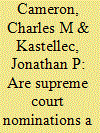

|
|
|
|
|
| Summary/Abstract |
We conduct a theoretical and empirical re-evaluation of move-the-median (MTM) models of Supreme Court nominations—the one theory of appointment politics that connects presidential selection and senatorial confirmation decisions. We develop a theoretical framework that encompasses the major extant models, formalizing the tradeoff between concerns about the location of the new median justice versus concerns about the ideology of the nominee herself. We then use advances in measurement and scaling to place presidents, senators, justices, and nominees on the same scale, allowing us to test predictions that hold across all model variants. We find very little support for MTM theory. Senators have been much more accommodating of the president’s nominees than MTM theory would suggest—many have been confirmed when the theory predicted they should have been rejected. These errors have been consequential: presidents have selected many nominees who are much more extreme than MTM theory would predict. These results raise serious questions about the adequacy of MTM theory for explaining confirmation politics and have important implications for assessing the ideological composition of the Court.
|
|
|
|
|
|
|
|
|
|
|
|
|
|
|
|
| 3 |
ID:
149671


|
|
|
|
|
| Summary/Abstract |
T his article highlights a gap between a great deal of constitutional theory and a great deal of the practice of democratic constitution-making. Drawing on data from democratic national and state constitutions, we challenge the consensus among constitutional theorists that a central purpose of constitutionalism is the entrenchment (the fortification against future change) of broad principles. The empirical reality is that the majority of democratic constitutions today are subject to frequent revision, and are therefore ill-equipped to facilitate the entrenchment of their contents. To explore the logic of these unentrenched documents, we identify the historical periods in which different geographic regions moved away from highly entrenched constitutions, and we examine the political contexts of these transformations. We find that, in each context, constitution-makers were attempting to limit the discretion of constitutional interpreters and implementers by drafting highly specific texts and by updating them in response to continually changing circumstances.
|
|
|
|
|
|
|
|
|
|
|
|
|
|
|
|
| 4 |
ID:
149683


|
|
|
|
|
| Summary/Abstract |
Why does prison social order vary around the world? While many of the basic characteristics of prisons are similar globally, the extent and form of informal inmate organization varies substantially. This article develops a governance theory of prison social order. Inmates create extralegal governance institutions when official governance is insufficient. The size and demographics of the prison population explain why inmates produce extralegal governance institutions in either decentralized ways, such as ostracism, or through more centralized forms, such as gangs. Comparative analysis of Brazil, Bolivia, England, Scandinavia, and men's and women's prisons in California provide empirical support.
|
|
|
|
|
|
|
|
|
|
|
|
|
|
|
|
| 5 |
ID:
149677
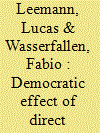

|
|
|
|
|
| Summary/Abstract |
A key requirement of democratic governance is that policy outcomes and the majority preference of the electorate are congruent. Many studies argue that the more direct democratic a system is, the more often voters get what they want, but the empirical evidence is mixed. This analysis explores the democratic effect of initiatives and referendums theoretically and empirically. The prediction of the formal model is that “bad” representation (i.e., a large preference deviation between the electorate and the political elite) is good for the democratic effect of direct democracy. An empirical investigation of original voter and elite survey data, analyzed with multilevel modeling and poststratification, supports this argument. Building on the literature, the findings of the analysis suggest that the extent to which direct democratic institutions are conducive for policy congruence—and may thus be advisable as democratic correctives to representative systems—depends on the political conflict structure.
|
|
|
|
|
|
|
|
|
|
|
|
|
|
|
|
| 6 |
ID:
149678
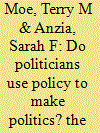

|
|
|
|
|
| Summary/Abstract |
Schattschneider's insight that “policies make politics” has played an influential role in the modern study of political institutions and public policy. Yet if policies do indeed make politics, rational politicians have opportunities to use policies to structure future politics to their own advantage—and this strategic dimension has gone almost entirely unexplored. Do politicians actually use policies to make politics? Under what conditions? In this article, we develop a theoretical argument about what can be expected from strategic politicians, and we carry out an empirical analysis on a policy development that is particularly instructive: the adoption of public-sector collective bargaining laws by the states during the 1960s, 1970s, and early 1980s—laws that fueled the rise of public-sector unions, and “made politics” to the advantage of Democrats over Republicans.
|
|
|
|
|
|
|
|
|
|
|
|
|
|
|
|
| 7 |
ID:
149682
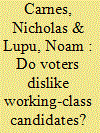

|
|
|
|
|
| Summary/Abstract |
In most democracies, lawmakers tend to be vastly better off than the citizens who elect them. Is that because voters prefer more affluent politicians over leaders from working-class backgrounds? In this article, we report the results of candidate choice experiments embedded in surveys in Britain, the United States, and Argentina. Using conjoint designs, we asked voters in these different contexts to choose between two hypothetical candidates, randomly varying several of the candidates’ personal characteristics, including whether they had worked in blue-collar or white-collar jobs. Contrary to the idea that voters prefer affluent politicians, the voters in our experiments viewed hypothetical candidates from the working class as equally qualified, more relatable, and just as likely to get their votes. Voters do not seem to be behind the shortage of working-class politicians. To the contrary, British, American, and Argentine voters seem perfectly willing to cast their ballots for working-class candidates.
|
|
|
|
|
|
|
|
|
|
|
|
|
|
|
|
| 8 |
ID:
149674
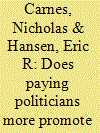

|
|
|
|
|
| Summary/Abstract |
If politicians in the United States were paid better, would more middle- and working-class people become politicians? Reformers often argue that the low salaries paid in state and local governments make holding office economically infeasible for lower-income citizens and contribute to the enduring numerical under-representation of the working class in our political institutions. Of course, raising politicians’ salaries could also make political office more attractive to affluent professionals, increasing competition for office and ultimately discouraging lower-income citizens from running and winning. In this article, we test these hypotheses using data on the salaries and economic backgrounds of state legislators. Contrary to the notion that paying politicians more promotes economic diversity, we find that the descriptive representation of the working class is the same or worse in states that pay legislators higher salaries. These findings have important implications for research on descriptive representation, political compensation, and political inequality.
|
|
|
|
|
|
|
|
|
|
|
|
|
|
|
|
| 9 |
ID:
149686
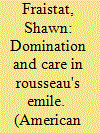

|
|
|
|
|
| Summary/Abstract |
Domination, understood as the abusive or capricious employment of power over others for the sake of one's own ends, is among the gravest threats to human freedom. Solving the problem of domination is a crucial normative challenge, and this article identifies in the work of Jean-Jacques Rousseau a promising and overlooked avenue for addressing it. I propose an interpretation of Rousseau's Emile in which preventing domination requires moral education in the practice and value of care. This interpretation gives Rousseau new relevance as a theorist of domination. In connecting non-dominative to educative care, Rousseau's approach has the potential to forge new connections between neo-republican theories of domination and feminist care ethics, even suggesting new routes by which public policy might foster a non-dominative society.
|
|
|
|
|
|
|
|
|
|
|
|
|
|
|
|
| 10 |
ID:
149669
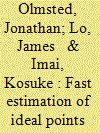

|
|
|
|
|
| Summary/Abstract |
Estimation of ideological positions among voters, legislators, and other actors is central to many subfields of political science. Recent applications include large data sets of various types including roll calls, surveys, and textual and social media data. To overcome the resulting computational challenges, we propose fast estimation methods for ideal points with massive data. We derive the expectation-maximization (EM) algorithms to estimate the standard ideal point model with binary, ordinal, and continuous outcome variables. We then extend this methodology to dynamic and hierarchical ideal point models by developing variational EM algorithms for approximate inference. We demonstrate the computational efficiency and scalability of our methodology through a variety of real and simulated data. In cases where a standard Markov chain Monte Carlo algorithm would require several days to compute ideal points, the proposed algorithm can produce essentially identical estimates within minutes. Open-source software is available for implementing the proposed methods.
|
|
|
|
|
|
|
|
|
|
|
|
|
|
|
|
| 11 |
ID:
149672
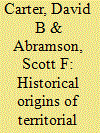

|
|
|
|
|
| Summary/Abstract |
Given the abundance of evidence that disputed territory matters, we know remarkably little about the origins of territorial claims. We argue that the presence of competing historical border precedents is central to the emergence of territorial claims. We outline why precedents provide opportunity to make claims and provide two possible explanations for why leaders have incentive to claim along precedents. One possibility is consistent with the conventional wisdom that incentive derives from territorial characteristics such as natural resources or strategic significance. A second and more novel explanation is that the persistent coordination effects of historical boundaries provide the incentive to draw claims along them. We use new data on the location of historical boundaries from the peace of Westphalia until the start of the French Revolution to show that historical border precedents drive the emergence of territorial claims after the Congress of Vienna and that persistent coordination effects provide incentive to dispute historical precedents.
|
|
|
|
|
|
|
|
|
|
|
|
|
|
|
|
| 12 |
ID:
149681
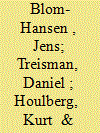

|
|
|
|
|
| Summary/Abstract |
Across the developed world, the last 50 years have seen a dramatic wave of municipal mergers, often motivated by a quest for economies of scale. Re-examining the theoretical arguments invoked to justify these reforms, we find that, in fact, there is no compelling reason to expect them to yield net gains. Potential savings in, for example, administrative costs are likely to be offset by opposite effects for other domains. Past attempts at empirical assessment have been bedeviled by endogeneity—which municipalities amalgamate is typically nonrandom—creating a danger of bias. We exploit the particular characteristics of a recent Danish reform to provide more credible difference-in-differences estimates of the effect of mergers. The result turns out to be null: cost savings in some areas were offset by deterioration in others, while for most public services jurisdiction size did not matter at all. Given significant transition costs, the finding raises questions about the rationale behind a global movement that has already restructured local government on almost all continents.
|
|
|
|
|
|
|
|
|
|
|
|
|
|
|
|
| 13 |
ID:
149684
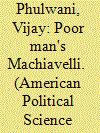

|
|
|
|
|
| Summary/Abstract |
This article presents Saul Alinsky's theory of community organizing as a democratic alternative to political realism's fixation on the coercive authority of the state and the ethical problems of statesmanship. Alinsky shows how the organizer can be used as a paradigmatic political actor in developing an approach to political ethics that treats power and self-interest as ethical concepts on which to construct a radical vision of democratic politics. His “morality of power” consists of learning how to use relational power and thick self-interest to develop democratic forms of deliberation and action. In contrast to the aim of the statesman, the organizer's goal is not simply to acquire power and learn how to wield it: An organizer helps the powerless learn how to use and think about power for themselves. Organizing is realist, pedagogical, and democratic, and Alinsky's ability to hold these ideas together makes him an important theorist of democratic agency in undemocratic times.
|
|
|
|
|
|
|
|
|
|
|
|
|
|
|
|
| 14 |
ID:
149680


|
|
|
|
|
| Summary/Abstract |
Is our moral cognition “colored” by the language(s) that we speak? Despite the centrality of language to political life and agency, limited attempts have been made thus far in contemporary political philosophy to consider this possibility. We therefore set out to explore the possible influence of linguistic relativity effects on political thinking in linguistically diverse societies. We begin by introducing the facts and fallacies of the “linguistic relativity” principle, and explore the various ways in which they “color,” often covertly, current normative debates. To illustrate this, we focus on two key Rawlsian concepts: the original position and public reason. We then move to consider the resulting epistemic challenges and opportunities facing contemporary multilingual democratic societies in an age of increased mobility, arguing for the consequent imperative of developing political metalinguistic awareness and political extelligence among political scientists, political philosophers, and political actors alike in an irreducibly complex linguistic world.
|
|
|
|
|
|
|
|
|
|
|
|
|
|
|
|
| 15 |
ID:
149668
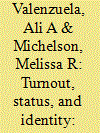

|
|
|
|
|
| Summary/Abstract |
The rise of micro-targeting in American elections raises new questions about the effects of identity-based mobilization strategies. In this article, we bring together theories of expressive voting with literature on racial and ethnic identification to argue that prior studies, which have found either weak or null effects of identity messages targeting minority groups, have missed a crucial moderating variable—identity strength—that varies across both individuals and communities. Identity appeals can have powerful effects on turnout, but only when they target politicized identities to which individuals hold strong prior attachments. Using two innovative GOTV field experiments that rely on publicly available data as a proxy for identity strength, we show that the effects of both ethnic and national identity appeals among Latinos in California and Texas are conditional on the strength of those identities in different communities and among different Latino subgroups.
|
|
|
|
|
|
|
|
|
|
|
|
|
|
|
|
| 16 |
ID:
149685


|
|
|
|
|
| Summary/Abstract |
Contemporary politics is often said to lack utopias. For prevailing understandings of the practical force of political theory, this looks like cause for celebration. As blueprints to apply to political practice, utopias invariably seem too strong or too weak. Through an immanent critique of political realism, I argue that utopian thought, and political theory generally, is better conceived as supplying an orientation to politics. Realists including Bernard Williams and Raymond Geuss explain how utopian programs like universal human rights poorly orient their adherents to politics, but the realists wrongly conclude that utopias and other ideal theories necessarily disorient us. As I show through an analysis of utopian claims made by Michel Foucault, Malcolm X, and John Rawls, utopias today can effectively disrupt entrenched forms of legitimation, foster new forms of political identity, and reveal new possibilities within existing institutions. Utopias are needed to understand the political choices we face today.
|
|
|
|
|
|
|
|
|
|
|
|
|
|
|
|
| 17 |
ID:
149675


|
|
|
|
|
| Summary/Abstract |
Public officials in John Rawls's well-ordered society face an assurance problem. They prefer to act in accordance with the political conception of justice, but only if they are assured that others will. On Paul Weithman's influential interpretation, Rawls attempts to solve this problem by claiming that public reason is an assurance mechanism. There are several problems with Rawls's solution: Public reason talk is too cheap to facilitate assurance, it is difficult to know when particular utterances express public reasons, and the requirements of public reason conflict with the fact of reasonable pluralism. We argue that convergence discourse—not public reason—solves the assurance problem by being a costly signal that indicates commitment to the political conception. This solution has none of Rawls's problems and has an interesting corollary: As diversity increases in society, so too does society's ability to solve the assurance problem. In short, the more diversity the better.
|
|
|
|
|
|
|
|
|
|
|
|
|
|
|
|
|
|
|
|
|